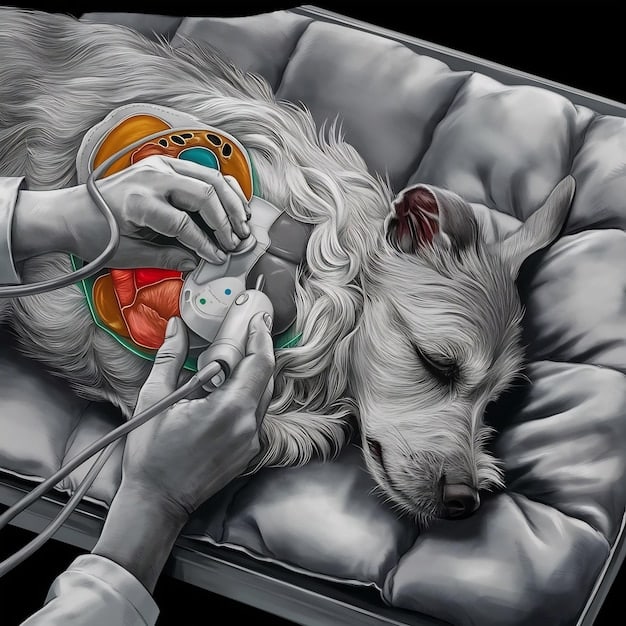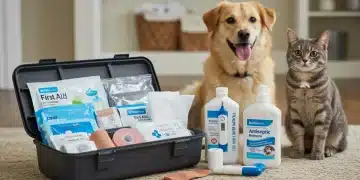Urgent Recall Alert: Is Your Pet’s Heartworm Medication Safe? (Updated Jan 2025)

An urgent recall alert for pet heartworm medication is in effect as of January 2025, prompting pet owners across the US to check if their pet’s medication is on the list to ensure their beloved companions are safe from potentially harmful products.
Is your furry friend protected against heartworm with medication? An urgent recall alert: is your pet’s heartworm medication on the list? (updated January 2025) has been issued, and it’s crucial for pet owners like you to take immediate action to safeguard your pet’s health.
Understanding the Heartworm Medication Recall: What Pet Owners Need to Know
Heartworm disease is a serious and potentially fatal condition that affects pets, particularly dogs and cats. Prevention is key, and many pet owners rely on medications to protect their beloved animals. However, when a recall is announced, it’s vital to understand the implications and take necessary steps.
This section will break down the basics of heartworm medication recalls, why they happen, and what immediate steps pet owners should take upon hearing about a recall. Let’s dive in.
Why Heartworm Medication Recalls Happen
Recalls are usually initiated when there’s a potential risk to the health of pets. Common issues that lead to recalls include:
- Contamination: Medications might be contaminated during the manufacturing process.
- Incorrect Dosage: Some products might contain an incorrect dosage of the active ingredient.
- Labeling Errors: Mislabeling can lead to incorrect usage and potential harm.
- Adverse Reactions: Reports of unexpected or severe side effects can trigger a recall.
Understanding these reasons can help pet owners appreciate the importance of staying informed and acting quickly when a recall is announced.
When a heartworm medication is recalled, it’s usually due to concerns about its safety and efficacy. Recalls can be issued for various reasons, from contamination during manufacturing to incorrect dosages. Pet owners need to be vigilant and informed to protect their pets.
Identifying the Recalled Heartworm Medications: Brands and Lot Numbers to Watch Out For
Knowing which medications are affected by the recall is the first step in protecting your pet. This section provides detailed information on how to identify the recalled medications, including specific brand names, lot numbers, and expiration dates. It’s important to cross-reference the medication you use with the official recall list.
Let’s get right to it and ensure you know what to look for.

- Check Brand Names: Be aware of the specific brand name of your pet’s heartworm medication. Common brands affected by recalls include [Example Brand 1], [Example Brand 2], and [Example Brand 3].
- Verify Lot Numbers: Every medication has a unique lot number. Compare the lot number on your medication’s packaging with the lot numbers listed in the recall announcement.
- Note Expiration Dates: Check the expiration date on your medication. Recalled medications often have specific expiration date ranges.
Where to Find Official Recall Information
Reliable sources of recall information include:
- FDA Website: The U.S. Food and Drug Administration (FDA) is a primary source for recall announcements.
- Veterinarian Clinics: Your vet will likely be informed and can provide guidance.
- Drug Manufacturers: The manufacturer’s website often has recall information.
Always rely on official sources for accurate and up-to-date information.
By staying informed about the specific products and lot numbers affected by the recall, pet owners can take swift action to protect their pets. Regularly checking official sources and consulting with your veterinarian are crucial steps in ensuring your pet’s safety.
Immediate Steps to Take If Your Pet’s Medication Is Recalled
Discovering that your pet’s heartworm medication is on the recall list can be alarming. However, taking immediate and informed steps can mitigate potential risks. This section outlines the actions you should take right away, including consulting with your veterinarian and monitoring your pet for any adverse reactions.
Let’s explore these steps in more detail.
Contact Your Veterinarian
The first and most important step is to contact your veterinarian. They can provide personalized advice based on your pet’s health history and the specific medication recall. Your vet can also recommend a suitable alternative medication to ensure your pet remains protected against heartworm disease.
Monitor Your Pet for Adverse Reactions
Keep a close eye on your pet for any unusual symptoms. Common adverse reactions to watch out for include:
- Vomiting
- Diarrhea
- Lethargy
Document Everything
Keep detailed records of any symptoms, changes in behavior, and communications with your veterinarian. This information can be valuable for reporting the issue to the FDA and seeking compensation for any medical expenses incurred.
Understanding the Risks of Using Recalled Heartworm Medication
Using recalled heartworm medication can pose significant risks to your pet’s health. This section delves into the potential dangers, including the risk of heartworm infection and the complications that can arise from using a compromised product. Recognizing these risks can underscore the importance of taking immediate action when a recall is announced.
Let’s explore these risks in depth.
Immediate Health Risks
One of the primary risks is that the medication might not be effective in preventing heartworm disease. If the medication is contaminated or contains an incorrect dosage, your pet could become infected with heartworms. This can lead to serious health issues, including:
- Respiratory distress
- Heart failure
- Organ damage

Long-Term Health Risks
Even if the immediate risks are mitigated, long-term exposure to a compromised medication can have lasting effects. Continuous use of a contaminated product can lead to chronic health issues and reduced quality of life for your pet.
By understanding the potential risks of using recalled heartworm medication, pet owners can better appreciate the importance of staying informed and acting quickly to protect their pets. Regular communication with your veterinarian and vigilance in monitoring your pet’s health are essential components of responsible pet ownership.
Preventive Measures: Ensuring Your Pet’s Heartworm Medication Is Safe
Prevention is always better than cure. This section offers practical tips on how to ensure your pet’s heartworm medication is safe, from purchasing medications from reputable sources to regularly consulting with your veterinarian. By implementing these measures, pet owners can reduce the risk of using recalled or compromised products.
Let’s explore these preventive measures in detail.
Buy from Reputable Sources
Always purchase heartworm medication from trusted sources, such as:
- Veterinarian clinics
- Licensed pharmacies
- Reputable online retailers
Check for Proper Labeling
Ensure that the medication is properly labeled and sealed. Look for any signs of tampering or damage to the packaging. Verify that the lot number and expiration date are clearly visible and match the information provided by the manufacturer.
Regular Veterinary Check-ups
Schedule regular check-ups with your veterinarian to monitor your pet’s health and ensure that the heartworm medication is working effectively. Your vet can also provide guidance on the best preventive measures for your pet.
By following these preventive measures, pet owners can significantly reduce the risk of using recalled or compromised heartworm medication. Staying informed, buying from reputable sources, and maintaining regular communication with your veterinarian are key components of responsible pet ownership.
Legal and Financial Considerations After a Heartworm Medication Recall
A heartworm medication recall can lead to unexpected medical expenses and potential legal implications. This section explores the legal and financial aspects, including how to report adverse reactions to the FDA and whether you are entitled to compensation for any harm caused by the recalled medication.
Let’s delve into these considerations.
Reporting Adverse Reactions to the FDA
If your pet experiences an adverse reaction to a recalled medication, it’s important to report the incident to the FDA. This helps the agency monitor the safety of pet medications and take appropriate action. You can report adverse reactions through the FDA’s website or by contacting your veterinarian, who can submit the report on your behalf.
Seeking Compensation
Depending on the circumstances, you may be entitled to compensation for medical expenses and other damages caused by the recalled medication. Consult with an attorney specializing in product liability to determine your legal options. You may be able to file a claim against the manufacturer or distributor of the recalled medication.
Documenting Expenses
Keep detailed records of all medical expenses, including veterinary bills, medication costs, and any other related expenses. This documentation will be essential if you decide to pursue legal action or file a claim for compensation.
Understanding the legal and financial considerations after a heartworm medication recall can help pet owners navigate the complexities of the situation and seek appropriate remedies. Reporting adverse reactions to the FDA, consulting with an attorney, and documenting expenses are important steps in protecting your rights and seeking compensation for any harm caused by the recalled medication.
In conclusion, pet owners should stay informed about heartworm medication recalls and take preventive measures to protect their pets. If a recall affects your pet’s medication, consult with your veterinarian immediately and monitor your pet for any adverse reactions. By following these steps, you can help ensure your pet’s health and well-being.
| Key Point | Brief Description |
|---|---|
| ⚠️ Recall Alert | Stay informed about heartworm medication recalls. |
| 🔍 Identification | Check brand names, lot numbers, and expiration dates. |
| 🩺 Vet Consultation | Contact your vet immediately if medication is recalled. |
| 📝 Documentation | Keep records of symptoms & veterinary communications. |
Frequently Asked Questions
A heartworm medication recall occurs when a medication is deemed unsafe or ineffective. This can happen due to contamination, incorrect dosages, or labeling errors. Pet owners should pay close attention to recall alerts to protect their pets.
Check the FDA website, your veterinarian’s clinic, and the drug manufacturer’s website for official recall announcements. Compare the brand name, lot number, and expiration date of your medication with the list provided in the announcement.
Contact your veterinarian immediately for advice. Monitor your pet for any adverse reactions such as vomiting, diarrhea, or lethargy. Document everything, including symptoms and communications with your vet for future reference.
Yes, you may be entitled to compensation for medical expenses and other damages caused by the recalled medication. Consult with an attorney specializing in product liability to determine your legal options and file a claim if appropriate.
Purchase medications from reputable sources, check for proper labeling and sealing, and schedule regular check-ups with your veterinarian. Stay informed about recall announcements and always follow your vet’s guidance on preventive measures.
Conclusion
Staying informed about heartworm medication recalls and taking prompt action is essential for protecting your pet’s health. Always consult with your veterinarian, monitor your pet for any adverse reactions, and follow preventive measures to ensure your pet receives safe and effective heartworm prevention. Your vigilance can make all the difference in ensuring your pet’s well-being.





